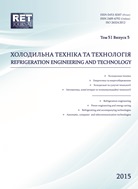ВЛАСТИВОСТІ ПЕРЕНОСУ НАНОФЛЮЇДІВ (ЕКСПЕРИМЕНТ І МЕТОДИ РОЗРАХУНКУ)
DOI:
https://doi.org/10.15673/0453-8307.6/2015.53684Ключові слова:
Теплопровідність – В'язкість – Нанофлюіди – Ізопропіловий спирт – Al2O3 – Компресорне мастилоАнотація
У статті наведено огляд та аналіз експериментальних досліджень і методів розрахунку теплопровідності і в'язкості нанофлюідів з частинками Al2O3. Розглянуто вплив основних факторів на властивості переносу нанофлюідів, включаючи концентрацію, розмір і форму наночастинок, спосіб отримання нанофлюідів і т.д. Наведено результати експериментального дослідження теплопровідності і в'язкості модельної системи ізопропіловий спирт - наночастинки Al2O3 при різних концентраціях наночастинок і температурах. Дослідження теплопровідності проводилося двома незалежними методами - стаціонарним і нестаціонарним методами нагрітої нитки. В'язкість вимірювалася за допомогою капілярних віскозиметрів. Досліджено також вплив добавки наночастинок на в'язкість холодильного компресорного масла. Результати вимірювань представлені у вигляді простих моделей.Посилання
SHIMCHUK, N.A., GELLER, V.Z. 2014. Influence of various factors on the thermal conductivity of nanofluids. Eastern-European Journal of Enterprise Technologies, Vol.72, № 6 (11), pp. 35-40. doi: 10.15587/1729-4061.2014.31386
TAVMAN, I., TURGUT, A., CHIRTOC, M., et al., 2011. Preparation and characterization of nanofluids containing alumina particles. Proceedings of the International Symposium on Thermal and Materials Nanoscience and Nanotechnology, Antalya, Turkey
WANG, X., MUJUMDAR A.S., 2008. A Review on Nanofluids – Part I: Theoretical and Numerical Investigations. Brazilian Journal of Chemical Engineering, 25(4), pp. 613-630. doi: 10.1590/s0104-66322008000400002
MAXWELL, J.C., 1881. A Treatise on Electricity and Magnetism. Second edition. Clarendon Press, Oxford, UK.
HAMILTON, R.L., CROSSER, O.K., 1962. Thermal conductivity of heterogeneous two component systems. Ind. Eng. Chem. Fundamen, 1(3), pp. 182-191. doi: 10.1021/i160003a005
EINSTEIN, A., 1906. A new determination of molecular dimensions. Ann. Phys, 19, pp. 289-306.
BATCHELOR, G.K., 1976. Brownian diffusion of particles with hydrodynamic interaction. J. Fluid Mech., 74(1), pp. 1-29. doi: 10.1017/s0022112076001663
ZHELEZNY, V.P., GELLER, V.Z., SHIMCHUK, N.A., et al., 2014. A comprehensive experimental study of thermal properties of isopropyl alcohol / Al2O3 nanofluids on the boiling line. Herald of Kazan Technological University, 17(21), pp. 97-99.


